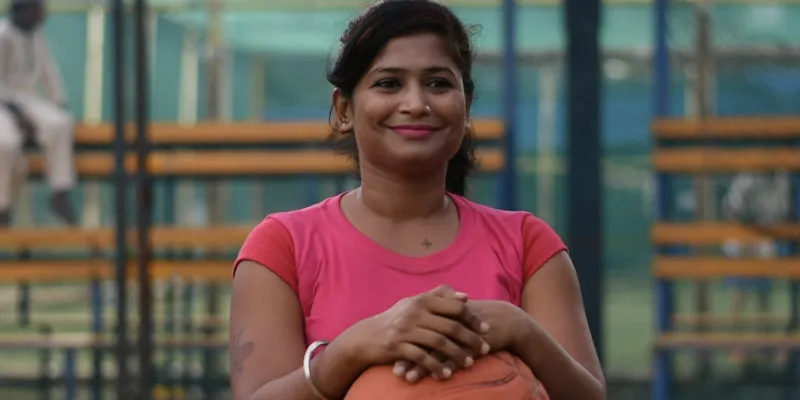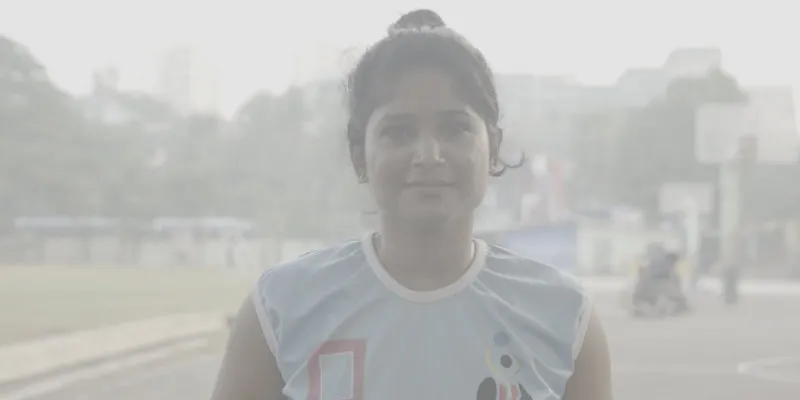Meet Nisha Gupta, the paraplegic athlete who believes disability is just a state of mind
After an accident left her paralysed waist down, Nisha Gupta gained strength by turning to sport. Now, she’s keen to inspire others to live fuller lives.

Nisha Gupta, 30, lives in Bhayander, Mumbai, with her husband and in-laws. This young woman has faced every curveball life threw at her and hit it out of the park. All due to her mental strength.
It couldn’t have been easy for a teenager to be saddled with a wheelchair. But Nisha, determined not to let disability define her existence, is now a paraplegic athlete par excellence.
Nisha is a national level swimmer and an international basketball player. She has won three state-level gold medals and three national-level bronze medals in swimming.
She won a bronze in the 2nd Wheelchair Basketball Tournament held in Delhi in 2015, incidentally the first time she ever played. She also secured the third place in the International Bali Tournament in 2017.
She currently plays for the Maharashtra Women’s Wheelchair Basketball team that secured the fourth place in the 2017 Nationals. She was felicitated by Sudha Chandran on Women’s Day for her achievements.
Life-altering moment
Simple, playful, naughty – these are some of the words that described Nisha as a child. A family vacation to Varanasi after her Class 12 with her parents and siblings seemed like it would be a happy beginning to college life, but turned out to be the start of Nisha's life-altering journey.
Nisha remembers that on May 1, 2004, she climbed a wall with her brothers to pluck some mangoes and fell off. She fractured her spinal cord and was paralysed waist down.
Her brothers, unable to pick her up as she was in excruciating pain, called their father who rushed to the spot. He thought that his daughter was unable to move because of a snake bite. With the help of two other people, Nisha's father took her home and laid her on the bed.
Nisha remembers that she had no sensation in her legs. She noticed blood on her father's T-shirt and realised that she had injured her head too and was bleeding. A doctor was called immediately; he checked her injuries and gave her medicines. But she started to throw up after some time and the doctor was summoned again. He suggested she be moved to a hospital as her injuries were serious.

As it was the wedding season, it took a couple of hours for the family to arrange for a car. Finally, when the car arrived, Nisha passed out in the vehicle from the pain. She woke up in hospital where the doctors stitched up the injury on her head, did an X-ray of her spine, and found that Nisha had fractured her spine.
The doctors suggested an immediate operation but her father refused as he wanted to take her back to Mumbai. After an agonising night, the family travelled and went to a hospital in Dadar, Mumbai. Her case was referred to many hospitals where most doctors recommended a spinal operation. They also informed her father that she might not be able to sit up again and might be bedridden for life.
Oblivious to her case developments, Nisha believed that she would get better.
“I thought people fracture their arms and legs all the time but it’s fixed and everything goes back to normal. I didn’t know this was a possibility and I might have to be in a wheelchair for the rest of my life,” she reminiscences.
The road to recovery
Nisha was operated on May 6, 2004. She was sent to a rehabilitation centre where they taught her how to adapt to her new condition. After spending five months at the centre, she was discharged and sent home.
Being sentenced to a wheelchair as a paraplegic at the age of 18 years put Nisha into depression. She spent the next four years confined to her house, sleeping and watching TV.
Seeing no light at the end of the tunnel, Nisha decided to visit her rehabilitation centre again.
She spoke to the doctors at length about her struggles with depression. They suggested she pay a visit to the Nina Foundation, an NGO for spinal cord injury patients. The doctor put her in touch with the Founder of the NGO, Ketna Mehta.
"They were conducting an event for awareness and that was the first time I went there. I saw Ketnadi on stage and she was dancing in her wheelchair,” Nisha recalls.
Nisha's meeting with Ketna was like the universe throwing her a raft. “There were a lot of wheelchair users there and I felt like maybe I’m not alone in this. I went back home and told my family about my experience there. For the first time I saw some hope for myself and my new life,” Nisha says.
A new lease of life
As a child, Nisha was not inclined towards sports. But destiny had other plans in store for her. After her visit to the Nina Foundation, Nisha attended one of their marathons. Here she made a friend, Oliver D’Souza, who was also in a wheelchair due to a spinal cord injury.
Oliver encouraged her to be more independent and travel alone. “He taught me how to do it - tell somebody at home to help you sit in the taxi and wherever you are going you will find somebody to help you get off and there won’t be any problem. I felt good and got more motivated,” Nisha shares.
Oliver used to swim and motivated her to learn too. Nisha says, “He influenced me to get into sports because exercise is very important for us. I got into swimming because of him and eventually started playing basketball too.”
Nisha's family and friends were extremely supportive of her decision. Countless hours of daily practice and careful monitoring of diet translated into medals at various para-sporting events.
"I work out every day and increase the intensity close to a match so that I am fully prepared for it. I practice moving quickly on my wheelchair for an hour every day,” she says.
"Sports has given a new meaning and direction to my life. Whatever I am today, it’s all thanks to the sports I play. I feel like a normal person when I play because I am able to do the same things as others,” Nisha says.
Lending a helping hand
It has not been an easy climb for Nisha. The four years after the accident were the darkest times of her life.
“I don’t want anybody else to leave the hospital and sit at home the way I did. I want them to go out and do something. I want them to live their lives,” Nisha says.
It is this thought that drove Nisha to get involved and give back to the community. She visits her rehabilitation centre every three months to motivate other people. She feels that as she is in a similar position as them, they are more likely to listen to her.
“When they see a girl like me achieve this much in life, they have a lot of questions.”
Nisha encourages people who are wheelchair bound to not lose hope and make something of their life.
“Nobody is going to help you unless you help yourselves. We need to show other people and the government that we exist,” she says.
Building an inclusive society
With government support nonexistent, Nisha has to overcome obstacles every day to continue her career in sports.
“Traveling in trains is the most difficult thing for us because trains in general and specifically the washrooms are not wheelchair accessible. They don’t provide financial aid in sports and don’t even give us government jobs to help us be financially independent,” Nisha laments.
She strongly feels that the government must work towards making India more disabled-friendly. Basic but essential facilities like ramps in public spaces and residential societies are a step in the right direction. Providing para-athletes with financial aid and government jobs will motivate people to start playing sports and maintain their health, she feels.
Making schools and education more physically and financially accessible for differently-abled kids is another area that needs focus.
“If they don’t study, how will they do something with their lives?” Nisha asks.
The road ahead
Nisha Gupta's life this far is a testament to the strength of the human spirit. But there’s a lot more she wants to do. She’s keen to continue playing and represent India internationally in the Olympics. She also wishes to open a rehabilitation home for wheelchair-bound people whose family cannot support them due to financial constraints. Other interests such as modeling and acting are also on her mind.
Her immense hard work and indomitable spirit caught the attention of Vitamin Stree, a content channel aimed at women from the house of Supari Studios. The team put out her inspirational life in the form of a video to raise funds for sports wheelchairs for Nisha's Women’s Wheelchair Basketball team.
You can watch the video here and donate to the campaign.







